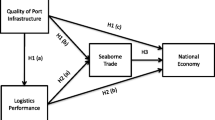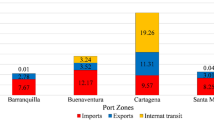Abstract
This paper examines the determinants of waterborne transport costs, with particular emphasis on the efficiency at port level. Its main contribution is (1) to generate statistically quantifiable measures of port efficiency from a survey of Latin American common user ports, and (2) to estimate a model of waterborne transport costs, including the previously generated port efficiency measures as explanatory variables. In order to incorporate different port efficiency measures from the survey, we use principal component analysis (PCA). Our estimations show that the specified variables in the model explain a great proportion of the change in waterborne transport costs. With regard to port efficiency, the result is especially important for one of the port efficiency measures obtained through PCA with an estimated elasticity equivalent to that of distance. Other explanatory variables which show to be statistically significant are the monthly liner service availability, distance, and the goods' value per ton. The conclusions are relevant for policy makers as they show and quantify that port efficiency is a relevant determinant of a country's competitiveness – and in this respect, there still exist big differences among Latin American countries. Unlike most other relevant variables, port efficiency can be influenced by public policies.
Similar content being viewed by others
Notes
Published information on US imports of merchandise is compiled primarily from automated data submitted through the US Customs' Automated Commercial System. Data are compiled also from import entry summary forms, warehouse withdrawal forms and Foreign Trade Zone documents as required by law to be filed with the US Customs Service. Import charges represent the aggregate costs of all freight, insurance, and other charges (excluding US import duties) incurred in bringing the merchandise from alongside the carrier at the port of exportation in the country of exportation and placing it alongside the carrier at the first port of entry in the United States.
References
Australian Productivity Commission. 1998: International benchmarking of the Australian waterfront. AUSINFO: Canberra.
Baños, J, Coto, P and Rodriguez, A . 1999: Allocative efficiency and over-capitalisation. International Journal of Transport Economics 2: 201–221.
Clark, X, Dollar, D and Micco, A . 2001: Maritime transport costs and port efficiency. Mimeo, World Bank, February.
Coto, P, Baños, J and Rodriguez, A . 2000: Economic efficiency in Spanish ports: some empirical evidence. Maritime Policy and Management 27: 2.
ECLAC. 2002: Globalization and development. Santiago, April.
Estache, A, González, M and Trujillo, L . 2001: Efficiency gains from port reform and the potential for yardstick competition. Mimeo. World Bank, Washington DC.
Fink, C, Mattoo, A and Neagu, IC . 2000: Trade in international maritime services: how much does policy matter?. Mimeo, World Bank, Washington, DC.
Fuchsluger, J . 2000: Maritime transport costs in South America. Masters Theses, University of Karlsruhe, Karlsruhe.
Gorman, M . 2002: Revisiting the JIT paradigm. Ascet 4: 104.
Gosh, B and De, P . 2000: Impact of performance indicators and labour endowment on traffic: empirical evidence from Indian ports. International Journal of Maritime Economics, II: 259–281.
Hoffmann, J . 2001: Latin American ports: results and determinants of private sector participation. International Journal of Maritime Economics 3: 221–230.
Hoffmann, J . 2002: The cost of international transport, and integration and competitiveness in Latin America and the Caribbean. ECLAC FAL Bulletin 191: 3.
Hummels, D . 2000: Have international transportation costs declined?. Mimeo, Chicago.
Kumar, S and Hoffmann, J . 2002: Globalization: The Maritime Nexus. Maritime business and economics. LLP: London, November.
Limao, A and Venables, J . 2001: Infrastructure, geographical disadvantage and transport costs. World Bank Economic Review No. 15, Washington.
Martinez-Budria, E, Diaz-Armas, R, Navarro-Ibanez, M and Ravelo-Mesa, T . 1999: A study of the efficiency of Spanish port authorities using data envelopment analysis. International Journal of Transport Economics 2: 263–281.
Martínez-Zarzoso, I, García-Menéndez, L and Suárez-Burguet, C . 2002: The impact of transport costs on international trade: the case of Spanish ceramic exports. Conference Proceedings, International Association of Maritime Economist, Annual Meeting and Conference. Panama, November.
Micco, A and Pérez, N . 2001: Maritime transport costs and port efficiency. Inter-American Development Bank, IADB Annual Meeting, Santiago.
Radelet, S and Sachs, J . 1998: Shipping costs, manufactured exports, and economic growth. Mimeo, Harvard.
Redding, S and Venables, J . 2001: Economic geography and international inequality. Mimeo, London.
Roll, Y and Hayuth, Y . 1993: Port performance comparison applying data envelopment analysis (DEA). Maritime Policy and Management, 20: 195–217.
Tongzon, J . 2001: Efficiency measurement of selected Australian and other international ports using data envelopment analysis. Transportation Research Part A: Policy and Practice 35: 314.
UNCTAD. 2002: Review of maritime transport. Geneva.
Valentine, VF and Gray, R . 2001: The measurement of port efficiency using data envelopment analysis. World Conference on Transport Research, Seoul, July.
Wang, TF, Song, DW and Cullinane, K . 2002: The applicability of data envelopment analysis to efficiency measurement of container ports. Conference proceedings, International Association of Maritime Economist, Annual Meeting and Conference. Panama, November.
Author information
Authors and Affiliations
Rights and permissions
About this article
Cite this article
Sánchez, R., Hoffmann, J., Micco, A. et al. Port Efficiency and International Trade: Port Efficiency as a Determinant of Maritime Transport Costs. Marit Econ Logist 5, 199–218 (2003). https://doi.org/10.1057/palgrave.mel.9100073
Published:
Issue Date:
DOI: https://doi.org/10.1057/palgrave.mel.9100073




